Last year, I discovered that it’s way more productive and interesting to make Best-Of lists that ignore artistic medium, so I’m going to continue that trend (I’m not gonna tackle music, though, because it’s too divisive and really needs its own list).
15. THE LAST OF US: PART II

I love this game. It’s a technical powerhouse, the gameplay is brutal and riveting, and it features best-in-class storytelling that surpasses Hollywood. I also love its diverse cast, and I’ll gladly throw down for Abby, the highly controversial and totally awesome addition to TLOU’s world.
And yet… it’s too damn long. If it were 15 hours, TLOU2 would be a roller coaster of non-stop highs; at 25, it’s often bloated and repetitive. And even though I appreciate the big risks they took with the story (and strongly disagree with the vitriolic reactions against them), I have to acknowledge that there’s a clumsiness to Naughty Dog’s technique here. They throw a lot of big twists at you, but they seem unable to accurately control how those twists affect the player. There’s a touch of insecurity to it at all, as if they’re lashing out at their audience with the biggest, most dramatic things they could think of, because they’re afraid of making something that doesn’t hit as hard as the original.
I’m also uncomfortable with an explicitly violent, exclusively linear game sermonizing about the cost of violence. TLOU2 will often force you to kill someone–sometimes in a cut scene, or a quick-time event–and then browbeat you about it later. That is disingenuous at best, hypocritical at worst. There’s an evergreen message about cycles of violence here, but it needed a gentle touch to tease it out. Naughty Dog went at it with a hammer.
At the end of the day, TLOU2 is an extraordinary achievement and I’m so grateful to have experienced it. But I’d file it under “Fascinating And Flawed,” not “Masterpiece.”
14. THE WAY BACK
 I’m as shocked as you are. “Ben Affleck Inspirational Basketball Coaching Movie” does NOT sound like something that would get a watch from me, much less a spot on my end-of-year list. But the old adage is true: it’s not what you’re about, it’s how you’re about it. At every step, “The Way Back” dodges tropes and mines truth from small moments. Writer-director Gavin O’Connor puts a much darker spin on the genre, and he zeroes in on the the grit and raw talent Ben Affleck has always had but often can’t locate. There are no easy, magical fixes or deus ex machinas here: just a lot of plainspoken truths about mistakes made and consequences faced.
I’m as shocked as you are. “Ben Affleck Inspirational Basketball Coaching Movie” does NOT sound like something that would get a watch from me, much less a spot on my end-of-year list. But the old adage is true: it’s not what you’re about, it’s how you’re about it. At every step, “The Way Back” dodges tropes and mines truth from small moments. Writer-director Gavin O’Connor puts a much darker spin on the genre, and he zeroes in on the the grit and raw talent Ben Affleck has always had but often can’t locate. There are no easy, magical fixes or deus ex machinas here: just a lot of plainspoken truths about mistakes made and consequences faced.
13. ASSASSIN’S CREED: VALHALLA

I have tried many “Assassin’s Creed” games in the past, and hated them all. Many times I was promised, “No this is the good one, they finally got it.” And it was always a lie… until now. “Valhalla” is the AC game where it all finally clicks for me. It’s not one big thing that makes the difference, it’s a lot of small stuff: slightly tighter combat, a little better story setup and character work, an extra coat of paint on the gorgeous world design. “Valhalla” sneaks its way into your heart by doing a lot well and nothing poorly. It’s very clearly indebted to “Witcher 3,” and it doesn’t reach those heights narratively, but when it comes to combat and game mechanics, it could teach Geralt a thing or two.
12. MCMILLIONS

Please go watch this riveting, hysterical, terrifying documentary about an elaborate plot to defraud the McDonalds Monopoly game. You’ll meet a cast of characters as fascinating and rich as any work of fiction (especially the gentleman pictured above), and discover painful lessons about the eternal lure of the quick buck.
11. DOOM: ETERNAL
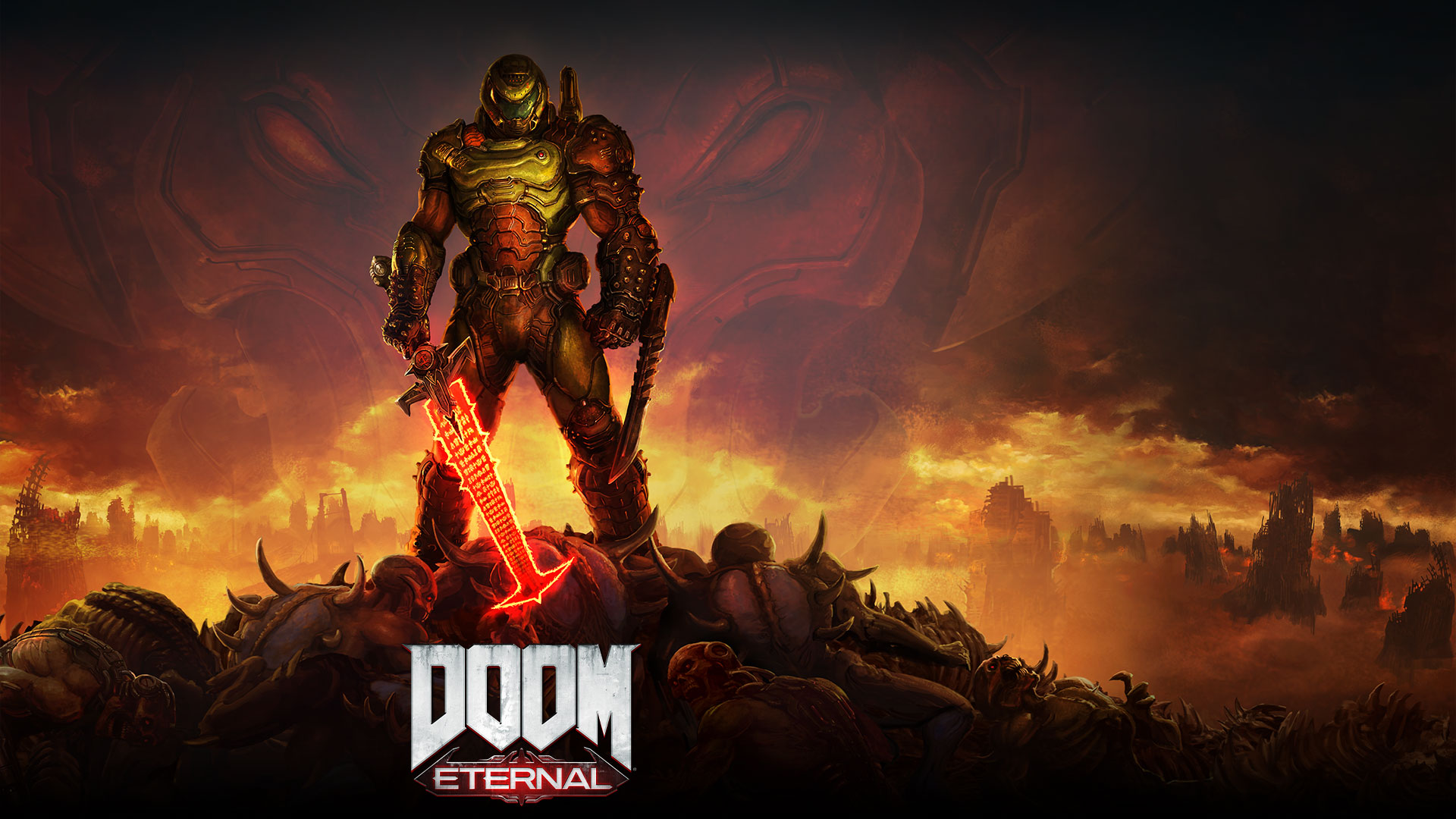
“Doom: Eternal” is one of the best first person shooters in years, full stop. I played through it twice, on fairly high difficulties, and I was enthralled both times through. My only hesitation about it is that I think id Software slightly overcorrected towards challenge and away from the power fantasy that made the 2016 game so fun. Of course, they insist “Doom: Eternal” is a power fantasy, just one you have to earn. But that’s a contradiction in terms: if you earn a power fantasy, it isn’t a fantasy at all, it’s just power. Life is full of things you have to earn. When I play “Doom,” I’d like to feel like a god, not a grunt in boot camp.
My other nitpick comes inside of a compliment: during certain boss fights in the game, you are offered super-strong armor if you die more than a set number of times. Using this armor does not affect progression in any way. I cannot applaud this choice enough, and I wish more games would do things like it. But here’s the critique: had they not added this feature, “Eternal” would have been ruined by its final boss fight, which is one of the most joyless slogs I’ve ever played. Even with the Armor, that final encounter is to be endured, not enjoyed. Which is especially odd considering most of the earlier boss fights (including the controversial Marauder, which I loved) are wonderfully designed. Maybe id Software ran out of time to finish the finale. If so, I’m glad they had the humility to offer a bail-out to the player. It saved their spot on this list.
10. GRIFTLANDS
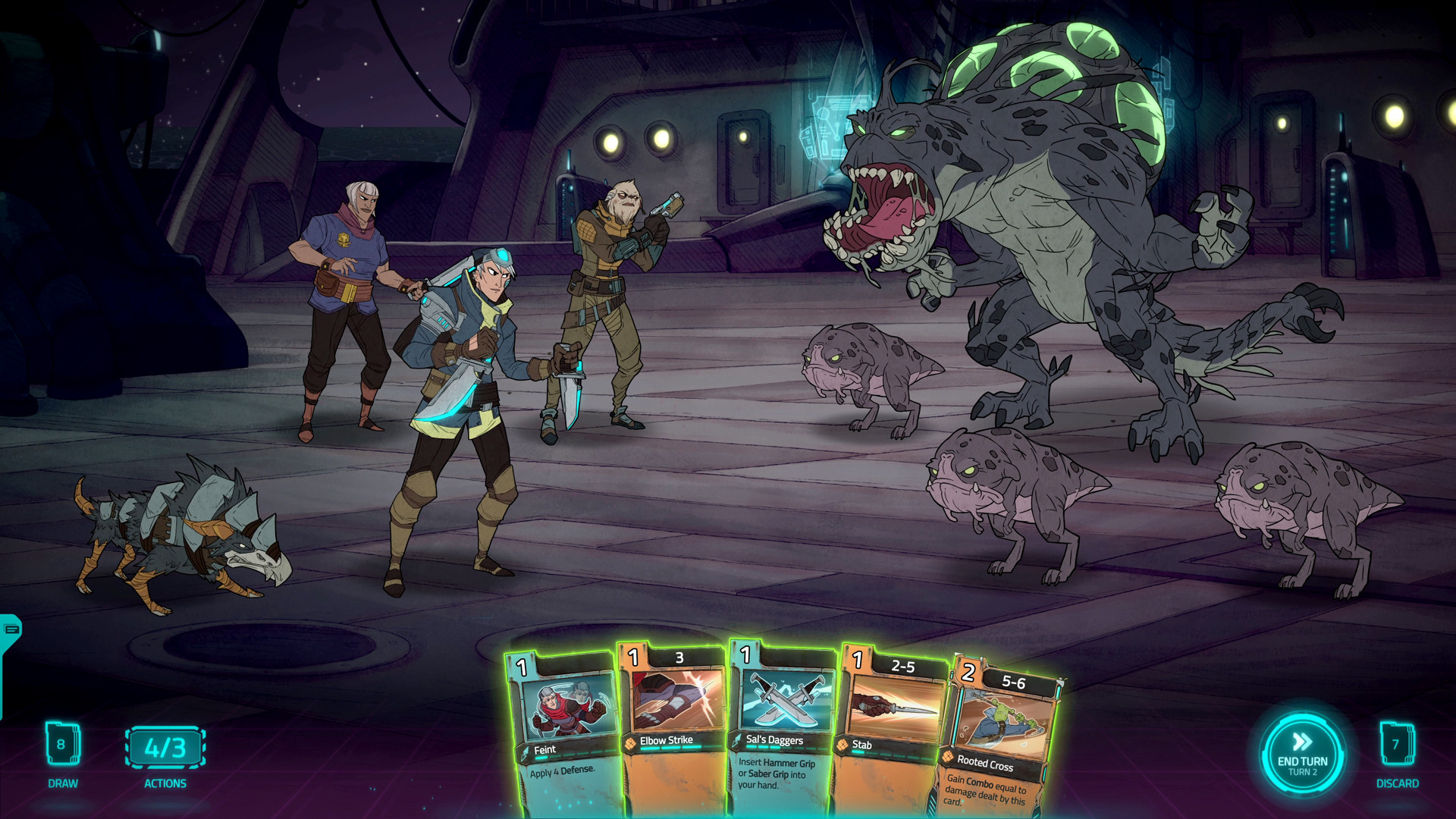
Imagine orchestrating an argument the same way you would a fight scene. That’s the hook of “Griftlands,” the new Early Access gem from Klei, the geniuses behind “Don’t Starve,” “Mark of the Ninja,” and others. “Griftlands” is a roguelike CCG (buzzwords much?) that is already crazy fun. The writing is sharp, the art gorgeous, and the gameplay polished to Klei’s impeccable standards. But what makes this special is there are two types of “combat” encounters: straight fights (punch, kick, jab, etc), and arguments (literally debating the other person until they go away). You’ll need separate decks of cards for each.
The arguments are where Klei shines. Somehow, they found a way to visually represent the flow of a debate as a turn-based combat experience: will you use logic to wear down your opponent’s resistance? Or maybe you want to browbeat them and scare them into submission? And underneath it all, the game is fun: just rogue-y enough to keep you on your toes, and stuffed to the gills with dry humor and brilliantly written characters. If this is Early Access, what the hell kind of masterpiece will it be when it actually comes out?
9. THE VAST OF NIGHT

I do not know how to explain “The Vast of Night,” or why it works. It really shouldn’t work.
At first it looks pretty normal, even obvious: a small town in the 50s is visited by aliens, and two intrepid denizens–a switchboard operator and a local DJ–try to get to the bottom of it. But we don’t really see the aliens. In fact, we barely ever go outside at all. “The Vast of Night” is about 60-70 percent dialog scenes, where we listen to people talk about things they’ve seen, or things that might be going on, with ominous music laid over. The whole movie feels like an assault on the adage “Show, Don’t Tell.”
And yet it works.
Director/Co-writer Andrew Patterson has some guts. He blows a huge portion of what must’ve been a small budget on a one-shot opener tracking shot that has nothing to do with aliens at all. Then he sets his characters down in switch board rooms, living rooms, and parked automobiles to just talk to each other. There are no ray guns. There are no action scenes, or big chases. The movie tells you there might be aliens in the sky right now, but it won’t show them to you. Even as I write it, it sounds ridiculous. But with a sure hand and a smart script, it all comes together. I can’t remember the last time I really believed in an alien visitation like I did this one.
“The Vast of Night” is a hushed, dread-filled experience that relies on the oldest and most potent special effect: great acting.
8. TENET

“Tenet” is a baffling movie. Almost no one understands it the first time through, and I was no exception. If “Inception” bumped up against the limits of what you can cram into a feature film, “Tenet” blows past them. To boot, it has some of Chris Nolan’s worst habits: too much exposition, complexity for its own sake, indefensible sound mixing.
And yet.
If you take the movie’s advice and stop trying to logic your way through things, if you just let go, “Tenet” is a joy. It’s truly original, toying with time in ways no one’s even conceived of before, much less executed at a 200 million dollar scale. It’s got jaw-dropping spectacle, relentless pace, and it’s all filmed in luxurious large-format that makes other action cinema look small and grainy. It’s anchored by John David Washington and Robert Pattinson’s effusive bro-chemistry, culminating in Nolan’s own spin on the end of “Casablanca.” Kenneth Branagh adds his name to the list of Nolan’s best villains as the bone-chilling Sator. And “Tenet” rewards multiple views. There is no weapon more powerful than a “rewind” button when you’re watching this beast, because it gives you what the theatrical experience couldn’t: time to catch up.
I know a lot of people hate this movie and I get why. It is confusing, full stop. But I contend that it’s meant to be confusing. Chris Nolan has publicly mused about the fact that his movies are held to a bizarrely high standard when it comes to logic and plot holes, where Marvel and others get a pass. I think “Tenet” is his final rebuke to that double-standard. He leaves you behind on purpose, so you’ll stop worrying about the wrong thing. Stop checking my math and watch the damn movie, he seems to be saying. In the same way that it’s fun to listen to the cast of “The West Wing” spout political jargon you don’t understand, it’s fun to watch “Tenet” run circles around you, because the basics of what’s going on–who’s our hero, who’s our bad guy, etc–are perfectly clear.
Yes, it’s a bit clunky. Yes, Nolan is starting to reaaaalllyy push it with “tell, don’t show” exposition. But I’m tired of Nolan’s films being evaluated only by what they do wrong, never what they get right. The Nolan Standard apparently is, “He must be perfect or it’s all garbage.” I disagree with that. There’s so much here that you just can’t get anywhere else. Why would you choose to be cynical about that?
7. HADES

This one pains me. The unanimous praise this game has received, and the way it ascended to being the “Cool” choice for Game of the Year, make the contrarian in me desperate to dislike it. Plus, I’m getting sick of roguelikes and roguelites and every other type of rogue. This should be an easy one to dismiss!
No such luck.
The pleasure of being a core gamer (bleh that term) is that you have a refined palette, and sometimes you play a game where a developer leaves grace notes that only you can appreciate. “Hades” is such a game. You’re in the hands of masters here. The art and writing are receiving a lot of praise, as they should, but the combat is the real achievement. This system makes you play like lightning. You’re going a million miles an hour, but somehow landing every hit. The player character reacts as fast as you can think; sometimes it feels like he can read your mind. The controls and aiming are perfect. Battles often descend into a wash of color and noise, and yet you never lose track of yourself or what you’re doing. You never miscue, never get stuck somewhere you didn’t mean to go. If you die, you made a mental error, nothing else. It is the best isometric combat I’ve ever played, hands down. “Diablo” just got dethroned.
It kills me to admit it, but this is what “Doom: Eternal” was trying to do; and they mostly succeeded, but “Hades” does it better. Because while “Eternal” pushed a little too hard at the player and sometimes created frustration or arbitrary death, “Hades” got the mixture dead-on. Playing this game is riding a wave. You’re at full exertion all the time, pushed to your limit, and yet you’re also on fire, unstoppable. “Hades” transforms you into a god. Almost every encounter, I pull off some incredible feat that I never would’ve thought I was capable of. And it wasn’t a quick-time event or a simple button press, it was a tactical decision at warp speed, and I did it. That’s great game design.
Supergiant has made a lot of good games (“Transistor” being my favorite), but they’re all obsolete now. “Hades” is the white whale they’ve been chasing their whole career. And it will be the standard by which all entries in the genre are evaluated going forward.
6. UPLOAD

Television comedy is having a renaissance. Time was, they stuck to cool young people having sex, and left the heady stuff to drama. No more. A wave of high-concept comedy, ushered in by “The Good Place” (which only didn’t get a spot here because it’s been on a list previously), has yoinked the ball from ponderous dramas like “Westworld” and found more substantive ways to talk about high-concept issues.
Enter “Upload,” an inspired and hilarious show about a near-future where you can insert your consciousness into a digital afterlife. The show explores a wide range of issues around that technology, while also creating the most affecting romance I’ve seen this year. This is a classic “have your cake and eat it too” situation: funny, romantic and charming, but also smart and sophisticated with lots to say. Season Two needs to hurry the hell up already.
5. CYBERPUNK 2077
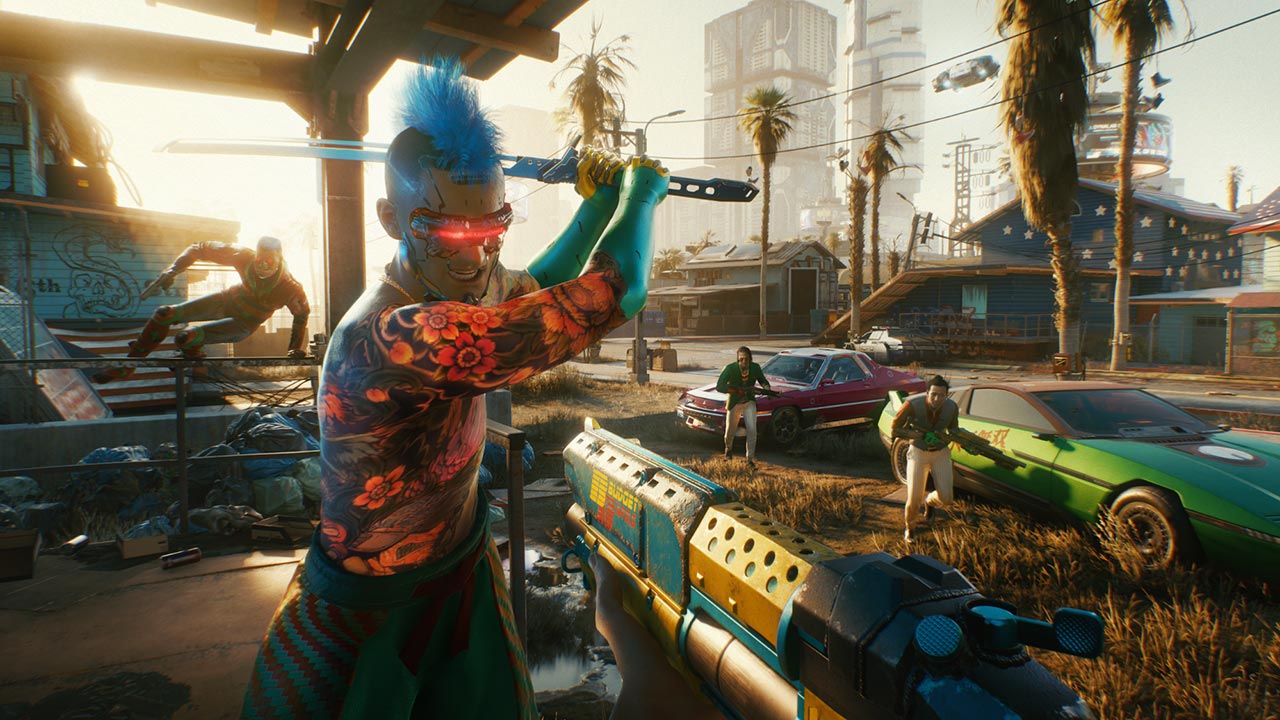
Let’s get this out of the way first: this game never should have been released on PS4/Xbox One as it is. There’s just no excuse. Sony did the right thing yanking it. I played this game on a Series X, and on that platform, it was only buggy enough to be very annoying. I had to restart a few missions. Some animations and AI went wonky from time to time. I had one really scary bug where my character refused to drive vehicles, which persisted across save files and a full reinstall, but eventually cleared itself up. CD Projekt Red’s senior management clearly blew this, and anyone who wants to write the game off because of it is well within their rights.
Okay. Now that we’re done with the bugs, let’s talk about the game itself.
“Cyberpunk 2077” is an amazing, once in a lifetime experience. You will never find a more immersive, intoxicating world to get lost in. You won’t meet a cast of more fascinating characters. And you definitely won’t get wrapped up in a core narrative with as much emotional oomph. It has amazing romance (correction: sorry “Upload,” the best romance of the year was here). It has thrilling adventure. It has nightmarish horrors. It accomplished everything narratively that “Red Dead Redemption 2” did last year, except faster and better. And I can’t say enough about the first person perspective. I’m in love with it. I spent so many hours just walking and driving around Night City, drinking it all in.
Now, to be clear, this is not a precision instrument like “Hades.” Driving can feel a bit floaty, I have a million little complaints about the UI, and the combat can bounce between too hard and too easy. But I don’t care, because it was all so much fun. I never got tired of blasting around Night City, dropping into gunfights (best gunplay in an RPG ever), sneaking around closed off facilities, stealing cars, wandering into random marketplaces. Every square inch of this game is fun, fun and more fun. A lot of the core systems (especially the AI) can be ganked, but why would you play it that way? Standing on a roof and shooting people, or creating traffic jams that never resolve, is like kicking through the mirror on the “Haunted Mansion” ride, then complaining it’s not scary. Why did you pay for a ticket if you didn’t wanna get in the spirit of the thing? I played “Cyberpunk” the way I thought it wanted me to, and Night City was so real I could smell it.
Great video game stories should line up with and enhance the action you’re taking in game. One of the reasons “Watch Dogs: Legion” failed so badly was that there was so much dissonance between who the story said you were (noble hero saving London) and what the gameplay said you were (total psychopath stealing cars and running over people). On the other hand, games like “Grand Theft Auto” overcorrect and make you an irredeemable sociopath, and I don’t like that solution either. I’ve never played a GTA-style game with a story that worked for me… until now.
This one works. They cracked it. (SPOILER) By casting you as a petty criminal trying frantically to reverse a fatal diagnosis, “Cyberpunk” gives you just enough rope to go wild in Night City without becoming a moral husk. If you’re breaking the law a little… well, you kinda have to, don’t you? And the flipside is juicy too: if you really are going to die, then carpe diem baby, go out in a blaze! It fits on top of the gameplay flawlessly. (SPOILER OVER)
They botched the release, no question there. There’s a larger conversation about bugs and stability that needs to be had, industry-wide. But “Cyberpunk 2077” is still an amazing ride, one I’m going to carry with me forever.
4. THE INVISIBLE MAN

Sometimes, a writer comes up with such a great idea that every other writer who sees it can’t help but curse themselves; “why didn’t I think of that?” That’s how I felt about Leigh Whannell’s inspired reversal of Universal’s “The Invisible Man,” turning the titular character into a psychotic ex-boyfriend stalking Elisabeth Moss, who is frantically trying to get anyone to believe her. “Invisible Man” engages with concepts like gaslighting, toxic masculinity, and the culture of disbelieving women, and I’d argue it does so more effectively than just making a story about those topics. The lens of science fiction and horror gives us just enough distance to see ourselves.
After years of collaborating with modern horror master James Wan, Leigh Whannell has matched him in the director’s chair. The opening sequence is an all-time classic. The finale brings down the house. Whannell’s camera terrorizes the audience, lingering in empty spaces and weaponizing our imagination as we scan the frame, looking for our villain. And of course, Elisabeth Moss puts the movie on her back, it’s nothing without her performance: compelling, relatable, unhinged, furious. Oliver Jackson-Cohen also shines, showing the nasty side of his boyish charm.
When it’s time to tally up our great horror thrillers, I say “The Invisible Man” belongs shoulder-to-shoulder with “Get Out.” It’s that good. Where the hell do you go from here, Leigh?
3. RAISED BY WOLVES (TIE)
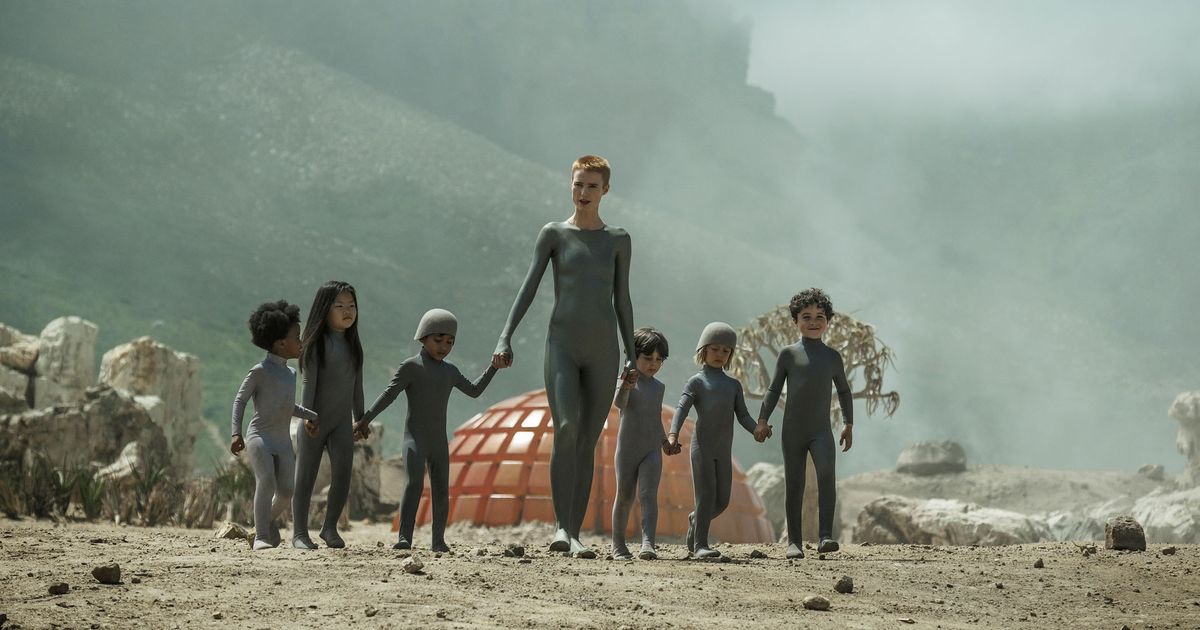
Yes, I’m using a tie for third to sneak an extra thing in here. Yes, that is cheating. No, I have no excuse for myself.
Look, “Raised By Wolves” makes me do stupid stuff. It’s the best thing Ridley Scott’s done in a while. It feels like the great sci fi novel that Heinlein never wrote. A lot of “sci fi” shows have spaceships or whatever, but this is science fiction damn it. It’s about big ideas and fundamental questions of humanity, examined through the lens of speculative technology. The visual parallels to the Crusades are loud to the point of deafening (Ridley really loves the Crusades), but that’s how I like it.
Describing the plot is an exercise in futility. It begins with a pair of humanoid robots who crash land on a planet and are tasked with raising a brood of human children. The leads–Amanda Collin and Abubakar Salim–give powerhouse performances, grounding this out-there concept and making it feel totally real. Where the story goes from there is pointless to even try and describe.
Just… it’s great, trust me. If you’re sick of the same IP, the same franchises over and over, and you want a show that is challenging, complex and original, “Raised By Wolves” is waiting for you.
3. SCHITT’S CREEK (TIE)
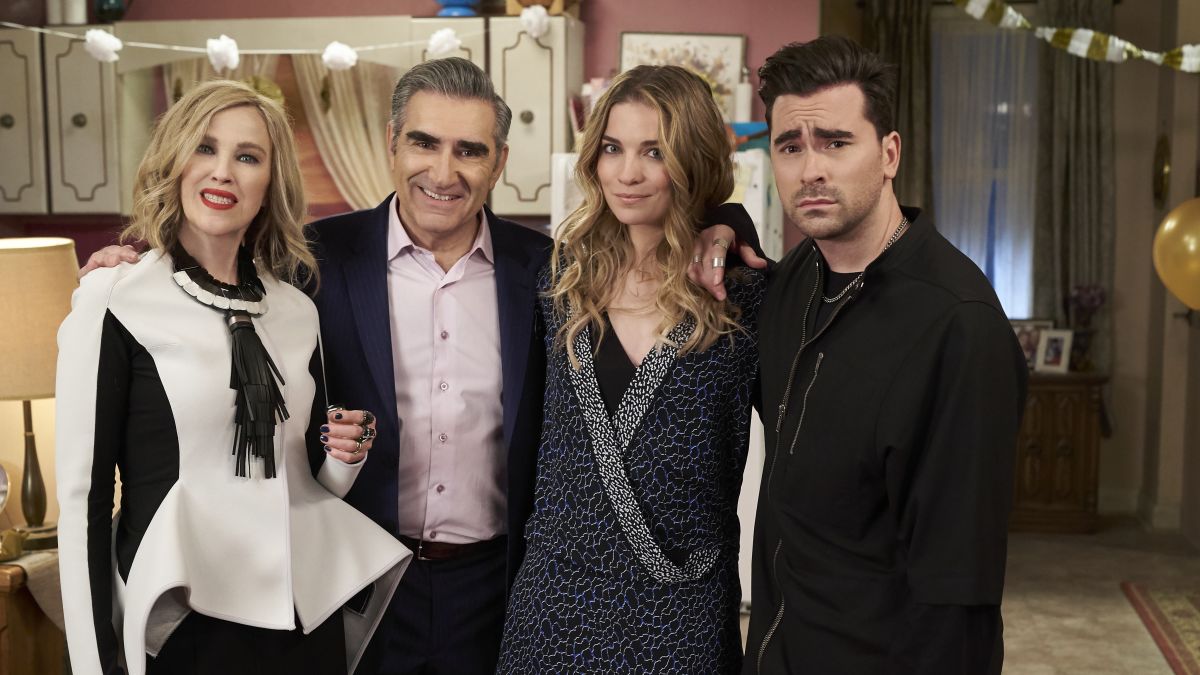
2020 was the year that Schitt’s Creek took over the world, won every award on Earth, and etched itself into history. At a time when a lot of people were suffering, a show full of love and optimism was just what the doctor ordered. It doesn’t have the savage punchlines of “30 Rock” or “The Office,” but it doesn’t need them. This is a hangout show. They create a cadre of delightful human beings and invite you to lounge around with them, trading jabs and learning to appreciate the small things.
Showrunner/Star/Co-Creator (think this guy has a future??) Dan Levy has gotten a lot of justified praise for prominently featuring LGBTQ characters and love stories, while simultaneously refusing to do narratives about homophobia. I have to admit, I was worried the latter was a mistake at first. But Dan and his team intuitively understood that by not acknowledging any “other side” to the issue, they were cutting hatred and bigotry off at the knees. They ripped the microphone out of Archie Bunker’s hands and told him to sit down and shut up, and I applaud them for it.
Not since “Seinfeld” has there been a better ensemble. Dan, his dad Eugene, Catherine O’Hara (the legend herself), and Annie Murphy play off each other perfectly. Everyone gets their moment to shine, and they all make each other better. Watching the show through a second time, I can see how each actor took their time sculpting their mannerisms, finding their voice. The David, Alexis, Johnny and Moira who enter the show are vastly different from the ones who exit it.
“Schitt’s Creek” is funny, and a blast to watch. It has no bad seasons and no bad episodes. But my favorite thing about it is its kind heart. It’s a truly beautiful show. Not enough of us even try for that.
2. HALF LIFE: ALYX
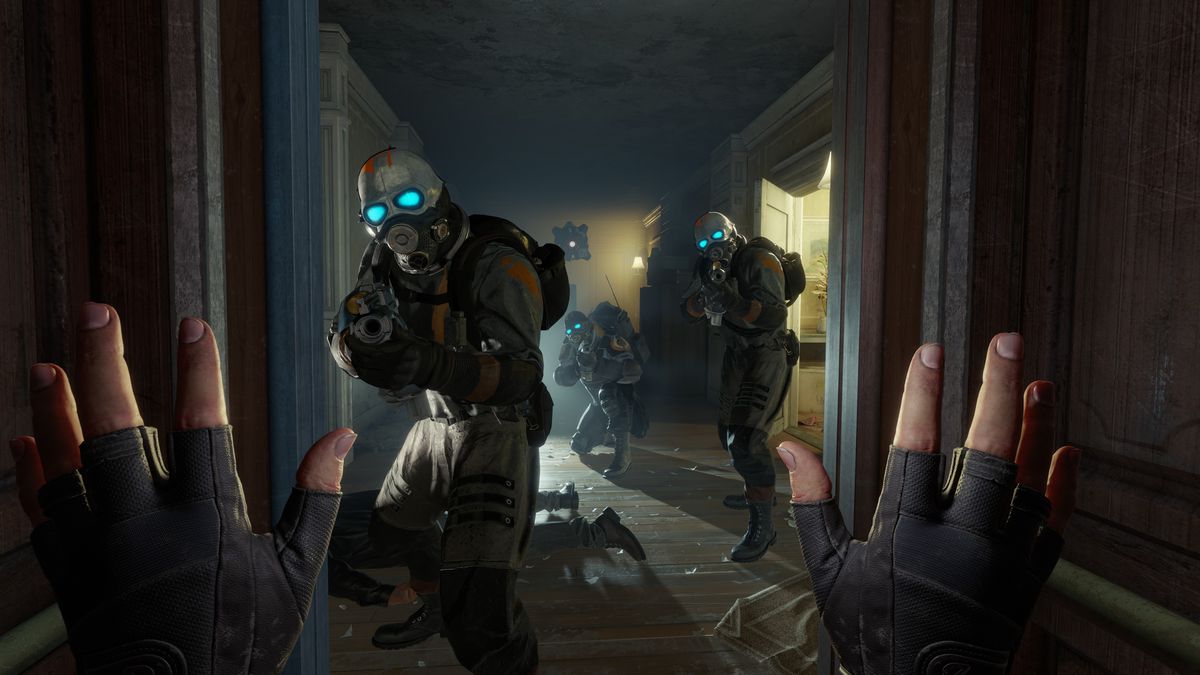
The best video game of 2020 was a VR game.
“Half Life: Alyx” is a proof of concept from the future. It shows the kinds of experiences that are possible in this medium if you’re willing to build them to the highest standards, with AAA resources. Mechanically, it’s a step or two behind “Boneworks,” and may be a slightly inferior game overall (although I’m biased). But as an experience, both for old “Half Life” fans and newcomers, it’s peerless. And it does more things well than any other game released this year.
The graphics and art direction will put your jaw on the floor. Ditto for the characters, brought to life with industry-best animation. Sure, other games have had good characters, but you actually have to make eye contact with these. The gameplay is maybe a touch on the simple side, but it’s deeply fun and flawlessly executed. And anyway, this isn’t “Dark Souls,” you’re not here to test your reflexes, you’re having an experience. As a friend once put it to me, “Half Life: Alyx” is a twelve hour Disney theme park ride with one passenger.
Classic moments are everywhere. A horror sequence in the middle is about as scared as I’ve ever been in a video game, and it never uses pop-outs. And the finale. Holy hell. Right when everything seems to be peaking, “Alyx” completely reinvents itself and launches you into a final chapter unlike anything I’ve experienced. I was shouting “No… no… what the hell… are you kidding me!!!” the whole time. My brain was on fire. I came out the other side unsure what my name was. Any other game this year accomplish that? Anyone? No? Didn’t think so.
On top of that, “Alyx” is brilliantly written: funny, heart-breaking, scary, and mind-bending. Characters don’t jabber exposition, they talk to each other. I really believed in these people. And Alyx herself is a strong, resourceful, but ultimately quite human lead. It’s not a comfortable thing to admit, but she’s an upgrade from her mute, emotionless predecessor.
I don’t play video games for the challenge. I don’t play them for the story (seriously, I don’t). I don’t even play them to connect with other people. I play video games for immersion. The more I feel plugged into an alternate reality, the better I like the game. “Half Life: Alyx” is the Mona Lisa of video game immersion. Valve took the most immersive artistic medium in human history and put it in overdrive.
Boot it up if you think you’re ready. But brace yourself, it’s powerful medicine.
1. SOUL

“Soul” is so beautiful and wonderful I don’t have words for it. I’m not gonna waste my time trying to sum it up. It’s Pixar, you know how it feels when Pixar is on. And they are on here. The fusion of abstract concepts like the afterlife with Pixar’s focus on grounded, relatable narrative creates sparks. How will these two incompatible forces reconcile each other?
Marvelously, it turns out. Pixar’s story formula benefits from being shot full of weirdness, and the weirdness benefits from coming down to Earth a little. That’s why “Inside Out” was such a masterpiece, and that’s why this is too. I remember watching “Coco” and wanting to like it more than I did. I think that film’s concept of death was too conventional, too grounded. I didn’t quite believe in it. I’m glad Pixar came back for another go, because this time, they took the training wheels off and went for it.
Everyone from the voice actors to the animators and sound engineers are relentless in pursuit of perfection. Directors Pete Docter and Kemp Powers annihilate every scene. Jamie Foxx and Tina Fey are marvelous. And of course, my guys Trent Reznor and Atticus Ross contribute their best scoring work in years.
The Pixar podium is now “Toy Story,” “Monsters Inc (my personal favorite),” and this. 2020 wasn’t a total waste after all.
BONUS CATEGORY: THINGS THAT DISAPPOINTED ME
MANK
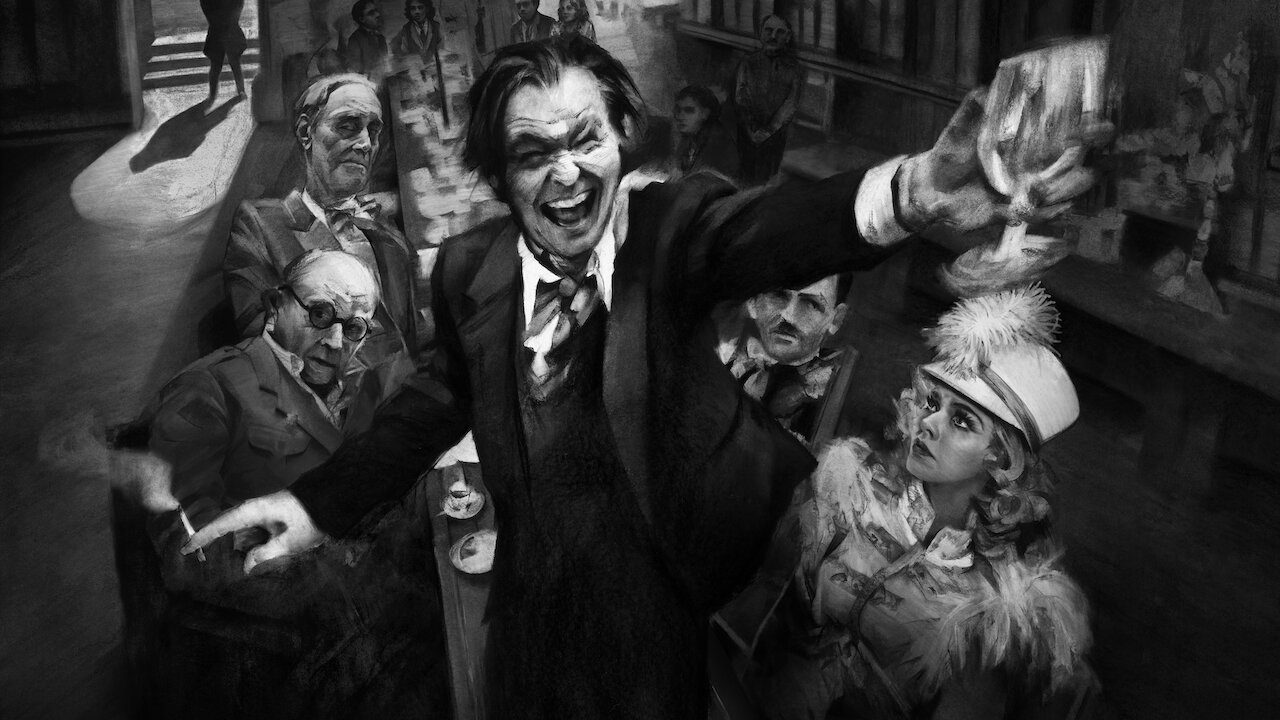
WTF, Fincher? Are you for real right now, my dude? You were on one of the best runs of classics in film history, and you threw it away for this?
“Mank” is a bad movie and there is no defending it. This is the dark side of Netflix’s blank check policy: sometimes, they go and waste everybody’s damn time. Like “The Artist” before it, “Mank” proves that movies affecting “old timey” usually suck and blow. But that’s not why it’s bad. It’s bad because it is a bad story with no emotion, no stakes, and no characters worth caring about. It’s bad because the dialog thinks it’s very clever and isn’t (being Aaron Sorkin or John Huston ain’t as easy as it looks). It’s a collection of scenes, almost none of which mean anything, that add up to even less. “Mank” is an inside joke, and I suspect a lot of people claiming to love it are just doing that thing you do at a party where you don’t get the punchline but you laugh anyway.
Go to Wikipedia and read the Plot Summary of this movie. Do you notice how incoherent it sounds? How nothing builds off of anything? It’s just a random assortment of scenes, most of them devoid of any feeling. The few that aim for some kind of catharsis miss it badly. And I never thought I’d say this about a David Fincher movie, but the acting sucks. Gary Oldman and Amanda Seyfried are in different movies. It’s not their fault, though. Nobody figured out what this movie is. Some actors play off the black-and-white, some ignore it. Reznor and Ross’ music hops around and tries to help out, but it can’t do anything, and you’re better off enjoying it on its own.
I’m not saying every movie needs to be a traditional, linear narrative. This year, I got into Wong Kar-wai in a big way, and I’d have killed for him to direct “Mank;” he’d have found you some blood in this thing. David Lynch would’ve dug up some existential dread, or maybe 180-ed around and gone “The Straight Story” with it. But Fincher, the master model-maker, the clinician, is just not suited to this work. He has no ear for the rhythms of the non-linear. He can’t bleed on the canvas. Why anyone would hire an OCD control freak to tell the story of an impulsive alcoholic is beyond me. It’s like watching Hans Gruber attempt slam poetry. Hard pass.
WONDER WOMAN 1984
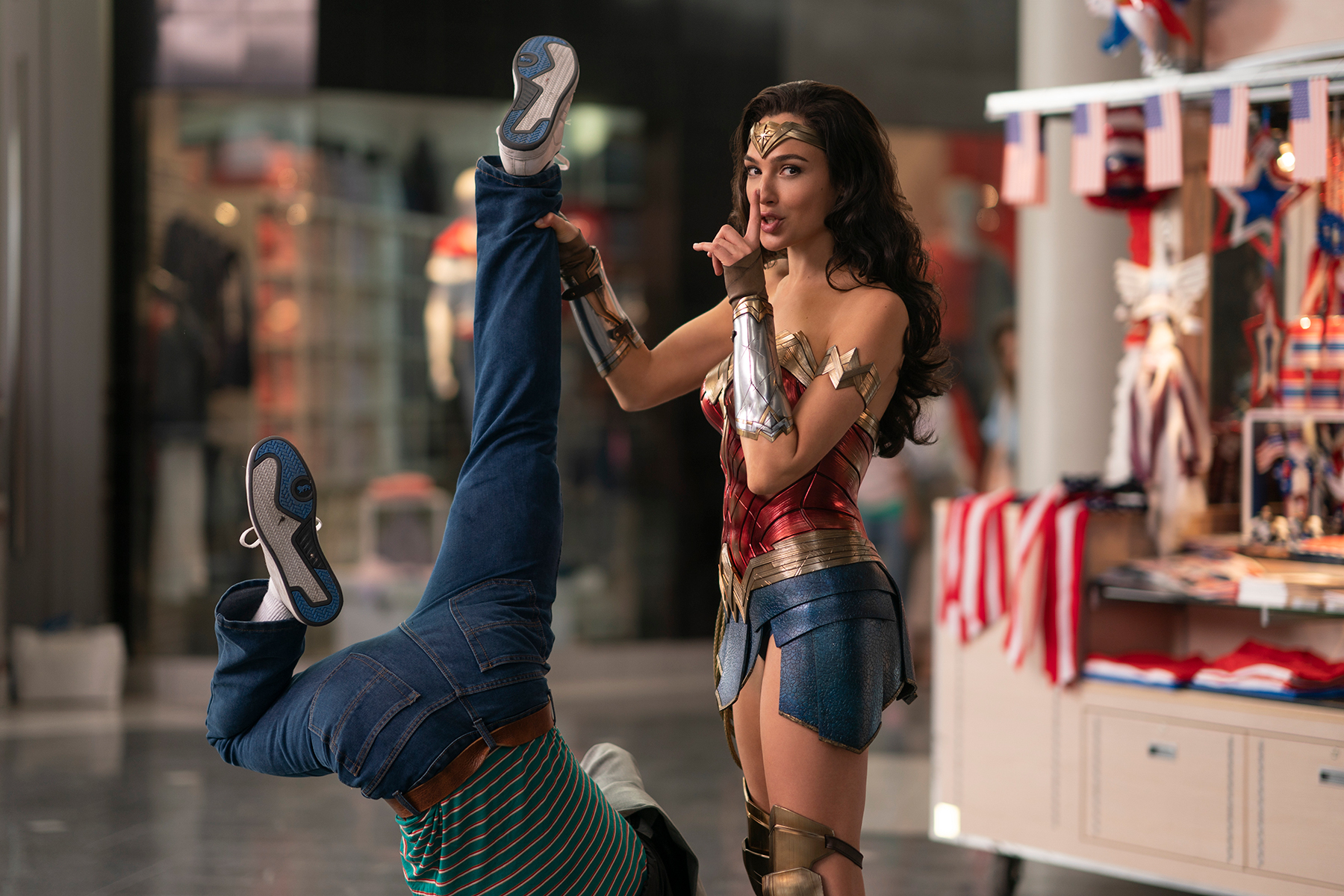 (SPOILERS) Gah, what a bummer this one is. Sometimes a movie does a lot of things right, and only a few things wrong, and the wrong things overwhelm it. That’s WW84 for you. They had so many good ideas: Kristen Wiig’s jealous everywoman turning into a monster to try and live up to her idea of Diana; Pedro Pascal as the embodiment of 80s excess; a Monkey Paw narrative writ large; Diana wishing Steve Trevor back to life, only to pay a price she didn’t anticipate.
(SPOILERS) Gah, what a bummer this one is. Sometimes a movie does a lot of things right, and only a few things wrong, and the wrong things overwhelm it. That’s WW84 for you. They had so many good ideas: Kristen Wiig’s jealous everywoman turning into a monster to try and live up to her idea of Diana; Pedro Pascal as the embodiment of 80s excess; a Monkey Paw narrative writ large; Diana wishing Steve Trevor back to life, only to pay a price she didn’t anticipate.
But damn it, it doesn’t hold together. The garish tone and color palette meant to evoke the 80s is really grating. It’s way too long. The opening scene serves no narrative purpose whatsoever and goes on (checks notes) forever; I suspect it was added just so they could open on an action beat. I don’t mind that there’s not as much action, but once the fighting does start, it’s really unremarkable. Diana flying looks downright silly.
Worse, the comedy and effortless chemistry from the original is gone. Chris Pine and Gal Gadot don’t generate the sparks they had on the first try, perhaps because their situation is so arbitrary and strange that the plot can’t get out of their way and let them feel each other out. And, as many people have pointed out, WW84 made the baffling decision to reincarnate Pine’s character inside another man’s body. They must’ve thought this was a really cool twist, but it’s not. I hated it. It felt creepy and weird and wrong, and I was supremely bothered by how little it bothered Diana. This is a concept for a horror film, not an inspirational superhero movie. True story: Pixar’s “Soul” has a similar thing happen to a cat, and they felt obliged to explain it more clearly and with more empathy than WW84 did when it happened to a human being.
Perhaps worst of all, the ending is a mess. The original “Wonder Woman” got a little stale and CG-heavy in the climax too, but apparently no one told them that, cause they went even harder into that mistake this time. The final showdown with Cheetah is poorly shot and weightless. The conclusion to Max Lord’s arc makes no sense (they’d never let Chris Nolan do this), sucks, and borders on deus ex machina.
I hate dragging this movie because I wanted to love it and there’s so much creativity in it. A lot of talented people really tried to make it work, and my heart breaks for them that it doesn’t. Patty Jenkins is still an ace filmmaker and I hope she takes another shot at Diana Prince. You’ll get it next time.
WATCH DOGS: LEGION

Damn it.
The concept was so brilliant. Instead of playing as one protagonist, you can recruit any person off the street to join a steadily growing gang of do-gooder hackers, fighting to reclaim near-future London from a corporate police state. But, I suspect, the Herculean effort of making the central mechanic actually work swallowed everything, and there was no time left to build a game around it.
“Watch Dogs: Legion” is like being given the world’s fastest car on a racetrack that’s ten feet long. Sure, I could recruit anyone off the street, but I can get through any mission with any person, so why would I? Most recruits have underwhelming stats, and the few who really bring something to the table are so dominant that you don’t need anyone else. Even late in the game, my gang was depressingly small. “Legion” kept sternly warning me to crew up, but I just didn’t need to.
And of course, as I mentioned during “Cyberpunk,” the story is broken. It’s too black and white and moralistic for its subject matter, it actually feels like you’re playing a piece of propaganda. And I just could not square the family-friendly Robin Hood narrative it was pitching me with the chaotic nature of a GTA-clone. I steal people’s cars just to get around in this game. I run people over and then drive off constantly. And yet somehow I’m a noble hero? Come on, guys. You can’t make a game about hackers that tries to exist in this Disney world of “ew they’re bad and you’re nice.” It feels bizarre. I found myself wondering if DeadSec might be brainwashed, since the worldview we were pushing was so monochromatic.
To be clear, this is not a bad game at all, I actually like it. It was at its best when I’d approach the same kind of mission with two different agents and it would play out almost like different games. But I’m still disappointed that they built such a unique and fascinating mechanic and then failed to get it off the launchpad.
More than anything else on this list, I am desperate for a sequel to “Legion.” Maybe with the foundation laid down, they can design a game that really stresses the system and draws fun out of it. Get back in the lab, team! I’m rooting for you.
-AA